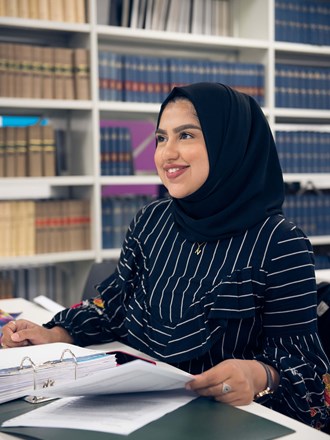

about Research and Scholarship
We are committed to developing and enhancing our student learning experience through research-informed teaching. We use research to inform teaching practices to deepen student engagement levels, provide world-class education, and generate high success in student achievements.
Welcome
At the University of Law, we are committed to ongoing enhancement of the student learning experience by fostering a strong and dynamic research culture and clear links between teaching, learning, and research. Research-informed teaching refers to the various methods through which students engage with research-based content and activities throughout their university education. Integrating research into teaching offers several advantages for students, such as:
- Increasing their understanding of real-world challenges
- Fostering critical thinking skills
- Building self-confidence
- Boosting career readiness and employability
- Strengthening digital literacy and networking abilities
- Elevating the visibility and value of undergraduate, postgraduate, and colleagues’ research.
Research and Scholarship Strategy
Our work takes a broad view on research, drawing on Ernest Boyer’s (1990) seminal writing on scholarship. He proposed a broader, more inclusive model that went beyond traditional research, identifying four interrelated dimensions of scholarship:
- Scholarship of Discovery – Traditional research focused on generating new knowledge.
- Scholarship of Integration – Interdisciplinary work that connects ideas across fields to provide new insights.
- Scholarship of Application (or Engagement) – Applying knowledge to real-world problems and contributing to society beyond the University.
- Scholarship of Teaching – Systematic study of teaching and learning processes, ensuring ongoing enhancements to students’ learning experiences and outcomes.
Building on these dimensions, the ULaw Research and Scholarship Strategy focuses on five key strategic areas aimed at enabling research and scholarship activity in various forms:
- Embedding research-informed teaching (RIT) in our curricula: To identify practices around RIT and to embed these practices in all undergraduate and postgraduate programmes.
- Working in partnership with our students: To establish a culture of research and scholarship through student-staff partnership educational research and curriculum enhancement projects.
- Facilitating student research: To provide discipline-based research experiences for students in all programmes.
- Establishing and growing research partnerships: To strengthen our research culture by developing partnerships with researchers and departments at other universities and organisations.
- Identifying links between disciplines: To establish themes at the intersection of all ULaw disciplines to facilitate outward-looking, interdisciplinary research.

Research Faculty at ULaw
Colleagues across the University are engaged in a variety of research and scholarship activities, contributing to a strong research culture and an enhanced student learning experience enriched by research-informed teaching. Research and scholarship is led by Dr Richard Bale, working with colleagues across the institution. Read about our researchers and their work below.
Dr Richard Bale
Director of Academic Development and Research
Richard has researched and published on various topics in educational development. He is currently conducting research on the cultural and linguistic factors in feedback processes, aiming to incorporate intercultural competence within existing frameworks of student and teacher feedback literacy. He has also recently completed a QAA-funded Collaborative Enhancement Project on ethical and equitable uses of Generative AI in assessment.
Previously, Richard has explored parallels between teaching and the performing arts, considering how skills and techniques used by actors, singers, comedians and other performing artists can be harnessed to improve higher education teachers’ performance and confidence.
Richard published his first book in 2020 based on this work: Teaching with Confidence in Higher Education: Applying Strategies from the Performing Arts. He is also the co-author (with Mary Seabrook) of the popular textbook for teachers in higher education: Introduction to University Teaching, published with Sage in 2021, with a second edition due for publication in Autumn 2025.


View our outputsOur Research Repository
Browse our research outputs in our GuildHE Research Repository.
Research integrity and ethics
We are committed to maintaining the University’s ethical, legal and professional obligations in respect of integrity, research, and scholarship in accordance with the Concordat to Support Research Integrity.
Ethics approvals are overseen by the University Research Proposals and Ethics Committee.
All forms and related documents are available on our policies webpage under “Research”. These policies are kept under periodic review.
Research support and Library and Learning Skills
A range of support is available to both our colleagues and students in relation to research and scholarship, including training through Academic Development and Study Skills, mentoring and publishing guidance, our community of practice groups, and funding and development opportunities through the Academic Development and Research team.
Our research is also supported through the collections and support offered by our Library and Learning Skills (LLS) team.
From the LLS website, staff and students can:
- Access online collections and discover materials relevant to business, computer science, criminology, education, law, policing and psychology research
- Enrol on the Skills Academy for self-directed materials on using key databases and collections
- Get support on finding and using information, and with the key referencing styles used at the University
Collaborate with us
We welcome collaboration requests from other universities, businesses and organisations that would like to work with our researchers, professional experts, or students. We can support projects relating to training and development as well as projects relating to innovation, consultancy, and enterprise.
Any enquiries should be sent to [email protected]
Seminar recordings
We run regular research and scholarship seminars for students and staff. You can access a selection of recent recordings below:
View our 2023 seminar recordings
A Case Study on the Breach of International Law and its Consequences - Savvas Michael (Summer 2023)
Terminal Sedation: Euthanasia by the Back Door? - Jo Samanta (Summer 2023)
The Issue of Propriety Rights in Digital Assets: Should a Third Class of Asset be Created to Revolutionise the Use of Blockchain in the Commercial World? - Alicia Bates (Summer 2023)
The Role of Artificial Intelligence in the Boardroom (March 2023)
The use of Technology in International Arbitration (March 2023)
A Critical Approach to Imposter Syndrome (February 2023)
Regulating in the Private and Public Interest - Thomas Bullman (February 2023)
View our 2022 seminar recordings
Science School Webinar: The State of Art Crime Policing - John Kerr (December 2022)
First Do No Harm: Truth-Telling in Medicine - Vicky Gregory (December 2022)
Directors Duties: A Consideration of Recent Case Law - Abigail Jackson (November 2022)
Dr Julie Prescott: Research Insights From a Psychologist (November 2022)
Dr Dan Weston: Categorical Analsis and Proportionality in Judicial Reasoning: Competing Approaches to Free Speech Regulation (October 2022)
Significant Moments: How Our Own Assessment Journeys Guide Us in Assessing and Providing Feedback to Others - Dr Patrick Baughan (October 2022)

